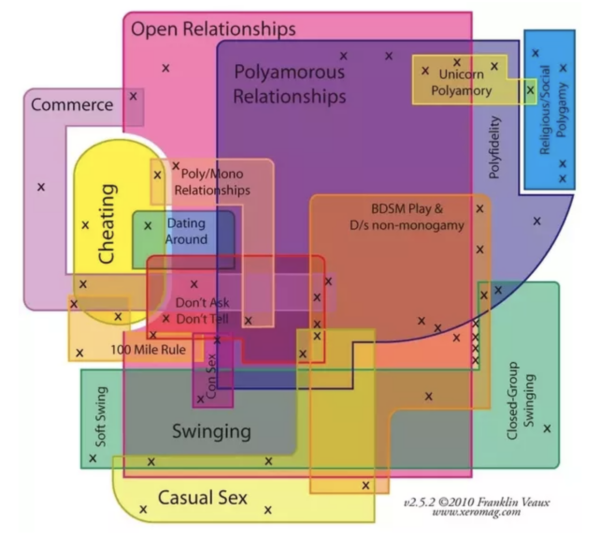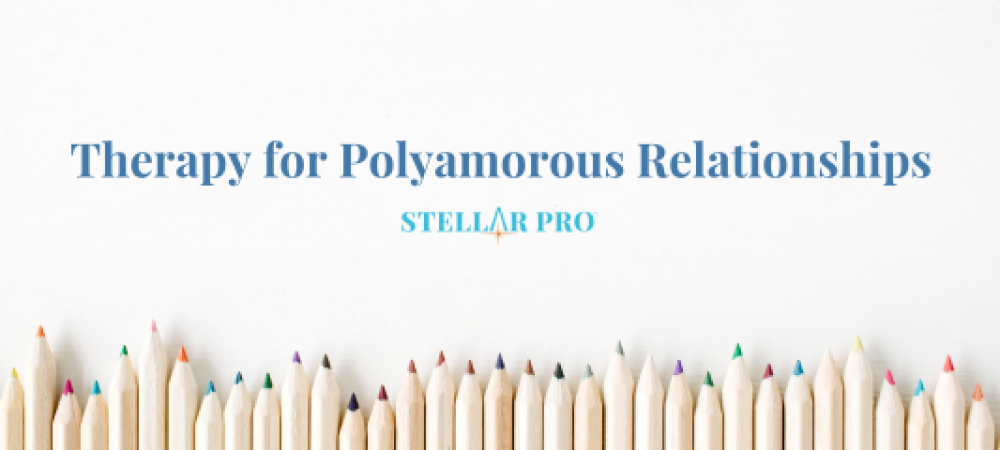Stellar Pro knows that being in an polyamorous relationship can be a great source of joy for many individuals. If you’re thinking about poly relationships or ethical non-monogamy or a poly relationship veteran, you can benefit from therapy for polyamorous relationships.
What is a polyamorous relationship?
Polyamory is a form of an ethical non-monogamy relationship. Polyamory refers to a relationship where people have multiple romantic and/or sexual partners. A polyamorous person may have their primary or nesting partner or they may have multiple. Polyamorous relationships can consist of groups of people or multiple, concurrent independent relationships. Each polyamorous relationship has their own unique definition.
The main difference between polyamory and open relationships is that polyamory can consist of multiple romantic partners and having intimate relationships with more than one partner.
Visual for just how many definitions to poly/open relationships there are:

– Unicorn Polyamory
– Dating Around
– Don’t Ask Don’t Tell
– Swinging
– Casual Sex
– Closed-Group Swinging
– BDSM Play & D/s non-monogamy
– Polyfidelity
– Religious/Social Polygamy
– Cheating
– Open Relationships
– Commerce
– Poly/Mono Relationships
– Soft Swing
– Con Sex
– 100 Mile Rule
– And more
Polyamorous relationships can take many forms. This list is only a small fraction of the types of poly/open relationships.
(H2) Why do people want to engage in Polyamorous Relationships?
People are unique and so are their reasons for engaging in polyamorous relationships. Sometimes one partner wants one thing and the other is not wanting to explore. This may allow the partner to explore freely with minimal stress or concern.
Mismatched sexual desire can be another reason for wanting to open a relationship. If one partner feels that their sexual needs are not being met due to a libido issue they may want to engage in poly.
Another reason is people in long-distance relationships. People in a LDR may agree to poly. This allows each partner to fulfill their needs that their primary partner cannot.
What matters is that you and your partner have discussed a polyamorous relationship and that terms have been established. If your partner begins to engage in a poly relationship without discussing it with you, it’s up to you if you consider that infidelity.
Can infidelity happen in a polyamorous relationship?
Absolutely. Infidelity may take a different form in a poly relationship than a monogamous one. If you find your partner(s) are going against the terms you may feel this is infidelity.
Therapists certified in polyamorous relationships can help you talk about infidelity in poly relationships.
What if I find out Poly isn’t for me?
Trying something new can be difficult. Sometimes, it’s even more difficult to admit you didn’t like it. Polyamorous relationships aren’t for every person. It’s important to communicate your feelings towards your partner about closing your relationship back up. This is when a certified poly therapist can help.
No matter your reason for wanting to close a relationship, poly certified therapists are trained in both opening and closing poly relationships and can help you. Remember, if you’re not enjoying poly you shouldn’t have to grin and bare it. Communicating your feelings in a safe environment is the first step towards that.
What is Therapy for Polyamorous Relationships?
Talking to your normal therapist about polyamorous relationships might be difficult. But therapy for poly relationships work the exact same way! You and your therapist will talk through the issues and answer questions you are having about polyamory. They might also provide worksheets or additional readings. Stellar Pro highlights clinicians who have received extra training in polyamorous relationships.
You may also see other types of clinicians advertising themselves as poly-aware and poly-friendly.
Poly-friendly therapists or poly-affirmative therapists are therapists who are open-minded and accepting of poly, but they may be lacking in experience and knowledge about poly.
Poly-aware therapists are clinicians who have received additional training in polyamorous relationships. They may or may not have further training in other forms of ethical non-monogamy.
Sometimes, poly isn’t the focus of your therapy and you just need a therapist who won’t try to change you. This is where a poly-friendly or poly-aware therapist might be the best option for you. But if you’re looking to dive deeper into poly, seeking out a Stellar Pro with advanced training or certification in consensual non-monogamy might be the best match for you. No matter which option you pick, all poly therapists should continue to educate themselves on polyamorous relationships while being aware of their own potential bias.
Why do I need Therapy for my Polyamorous Relationship?
Poly therapy is for all! Whether you’re starting out your poly journey or are a veteran, poly therapy can help. Poly therapy is different from non-poly therapy in that it focuses on polyamory. Partners or individuals wanting to engage in polyamory can benefit from having a professional, neutral third-party listen to their concerns before starting poly. You may uncover things you didn’t even know about yourself and/or your partner(s)! Or you may learn something new about poly.
For those just starting out in poly, a therapist certified in polyamorous relationships can help answer questions you have about poly. Maybe you’re not sure why you want to be in a poly relationship. Maybe you’re having trouble meeting people. No matter the stage in your poly journey, polyamorous relationship therapy is here to help.
To get the best results out of your poly therapy you need a therapist who is knowledgeable about poly. Non-poly-aware, non-poly-friendly, or non-polyamorous certified therapists may not be able to help you navigate poly.
What can Polyamorous Relationship Therapy help me with?
– Navigating boundaries
– Improved communication
– Differences in opinion on poly relationships
– Jealousy or anger
– Broken agreements
– Negotiation contracts
– Infidelity
– Grief and Loss
– Navigating stigma from cultural or family
– Navigating personal sexual values and belief systems
– Being hesitant or skeptical
There are some of the benefits clients can gain from attending poly therapy. Getting results from therapy requires effort and hard work on all parties involved. Some clients only need 1-2 sessions to see the benefits while others need something more long term.
No matter how long your poly therapy journey takes you, your therapist is here to guide you.
Do I need therapy for a polyamorous relationship?
Every poly relationship has their own reasons for wanting to attend polyamorous therapy. Polyamorous relationships require a lot of communication and sometimes that can be difficult. No matter your reasons to wanting to attend therapy for your polyamorous relationship, attending therapy can help.
What are common reasons to go to Therapy for Polyamorous Relationships?
Here are a few reasons why clients seek out therapy for polyamorous relationships:
– Navigating boundaries
– Communication issues
– One partner wishes to engage in poly and the other does not
– Jealousy or anger
– Broken agreements
– Negotiating contracts
– Infidelity
– Grief and Loss
– Stigma from cultural or family
– Navigating personal sexual values and belief systems
– Being hesitant or skeptical
– NRE or New Relationship Energy
– Throuple’s V’s, W’s and moresomes
If you find yourself relating to the items on the list, you and your partner(s) may benefit from therapy for polyamorous relationships.
Do I need to be in a polyamorous relationship to attend therapy for polyamorous relationships?
That’s the best thing. You don’t! Polyamorous certified therapists welcome all individuals. Even if you’re just thinking about poly to poly veterans. Talking about your needs, desires, and any questions you may have with a professional certified in polyamorous relationships can be beneficial. You may find that poly is perfect for you. Or you may find that poly isn’t for you at all.
My partner wants a polyamorous relationship but I do not.
Poly is not right for everyone. Just how monogamy isn’t right for everybody.
Even if you’re confident in your stance on polyamorous relationships, attending poly therapy can still be beneficial. You and your partner can discuss your feelings as to why you do and do not want to open the relationship. You two may discover a deeper reason for wanting to engage in poly that can be satisfied without opening the relationship. Or you may learn that opening the relationship is the only way to satisfy that desire.
What can I expect from Therapy for Polyamorous Realtionships?
Like non-polyamory therapy, polyamorous relationship therapy can is either online or in-person. Poly therapy is like any other therapy session except the focus is poly relationships.
You and your polyamorous relationship therapist will work together to understand the issues you are facing. These can range from “How do I get started in poly?” to “How do I tell my partners I want to stop poly?” to everything between.
Your therapist may give you worksheets or specific task goals – such as journaling. They may also recommend books such as It’s Called Polyamory: Coming Out about Your Nonmonogamous Relationships by Tamara Pincus and Rebecca Hiles.
As with any therapy, polyamorous relationship therapy may take a few sessions before you see a great improvement. Each client is different. Some clients only need 1-2 sessions while others need a more long term schedule. No matter how long poly therapy takes, remember that every session is helping you work towards understanding your desires and needs.
Why is it important that my therapist is certified in Polyamorous Relationships?
Therapists who have received additional training in polyamorous relationships are uniquely equipped to handle therapy for polyamorous relationships. Polamorous relationship therapists are also encouraged to analyze their own relationship biases.
You may see therapists who specialize in polyamorous relationships as Consensual Non-Monogamy (CNM) certified. CNM certified therapists specialize in multiple forms of consensual non-monogamy including: poly, open relationships, and swinging.
A consensual non-monogamy certified therapist will have received extra training in the following:
– Reasons to be in a poly relationship(s)
– Common mistakes when starting out
– Structures of new relationships
– Negotiating, renegotiating, and setting boundaries
– Making sex-safe agreements
– How to deal with jealousy
– Managing daily life – finances, time management, paid vs unpaid work
– Managing conflict and power dynamics
– How to deal with consent violations
– Defining members in a polyaffective family
– Coming out – including as a poly parent
– Polyaffective marriages
– Poly-pregnancy
– Dealing with friends, family, coworkers, and school
– Aging body and mind
– Retiring and how that relates to consensual non-monogamy – including shifting relationships
– Impact of poly on raising children
– Legal issues, medical institution tips, dealing with discrimination
– Breaking up
– Death and dying
– Addressing grief
The above is not an all-inclusive list but is meant to give you an idea of the extra training a consensual non-monogamy certified therapist will have received.
CNM therapists understand that polyamorous relationships are healthy and perfectly normal. Seeing a CNM certified therapist for your therapy for polyamorous relationship needs is the best way to analyze your relationship and gain a deeper understanding in a judgement-free space.
Stellar Pro has clinicians experienced in polyamorous relationships. A clinician who has submitted verification of their training in consensual non-monogamy will have a badge on their profile.
What benefits can I expect from Therapy for Polyamorous Relationships?
Each poly relationship is unique. Some benefits you may experience are:
– Deeper connection to your partner(s)
– Improved communication skills
– Increased pleasure and satisfaction
– Understanding how to set boundaries and what to do when those boundaries are violated
– Increased confidence
All therapy takes time and effort from all parties to be effective. Some clients only need 1-2 sessions while others need many more. What matters is that you feel you are gaining a deeper understanding of your relationship and what a poly relationship means to you.
Why should I choose Stellar Pro to find a Polyamorous Relationship Therapist?
Stellar Pro is the only therapy directory that verifies and highlights clinicians’ advanced training and expertise. We make it easy to find a therapist that specializes in polyamorous relationships. When you find a therapist on Stellar Pro you are assured that you are matching with somebody who is trained in polyamorous relationships.




